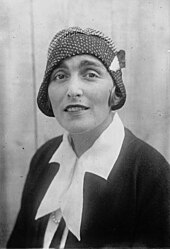Suzanne Crémieux
Suzanne Fernande Soltana Crémieux (married writer ; born June 29, 1895 in Paris , † July 11, 1976 ibid) was a French politician of the Parti radical and women's rights activist. She was a member of the Conseil de la République from 1948 to 1955 and a member of the French Senate from 1959 to 1976 .
life and career
The daughter of Senator Fernand Crémieux spent her childhood in the Gard department in the south of France . As a young adult she was involved in numerous organizations, including those for equal rights for women. After her marriage to Robert Servan-Schreiber , editor of the business newspaper Les Échos , in 1916 she was surnamed Schreiber . The couple had three children. Her son Jean-Claude Servan-Schreiber became a politician and MP in Paris. Her daughter Marie-Claire became a journalist and later married the Prime Minister Pierre Mendès France .
Suzanne Schreiber worked as a journalist. In 1924 she joined the left-wing liberal Parti radical , to which her father was a member, and in 1928 she was elected to the party's executive committee. In addition, she was involved with the Union française pour le suffrage des femmes (UFSF) for women's suffrage (which was only introduced in France in 1925 at the municipal level and in 1944 at the national level), she was chairman of a medical aid organization for students and in 1928 co-founder of the Center national d'information sociale . At the beginning of the 1930s she was a delegate to the League of Nations .
From 1938 she worked in the management staff of the Health Minister Marc Rucart , where she mainly dealt with questions of mother and child protection. After the outbreak of World War II, she was responsible for evacuating children from the Paris area. After Marshal Pétain came to power and the Franco-German armistice in June 1940, Schreiber belonged to a large group of politicians who opposed the Pétain regime and went to Casablanca on the passenger steamer Massilia . During the war, the Schreiber couple divorced and she returned to her maiden name.
After the liberation of France , Crémieux became deputy party leader of the Parti radical. In 1946 she stood as a candidate for the Radicals in the Gard department for elections to both the National Assembly and the Conseil de la République (Upper House of Parliament, colloquially known as the Senate), but lost both. Two years later, however, she was elected senator and joined the faction of the bourgeois Rassemblement des gauches républicaines (RGR). She was a member of the Committee on Overseas Territories and in 1951 became Vice-Chair of the Committee on Universal Suffrage. In 1955 she lost her Senate seat. She then belonged to the parliament of the Union française (consisting of metropolitan France and its former colonies) until 1958 .
After the founding of the Fifth Republic , she was able to move back into the Senate in 1959, where she sat in the Gauche démocratique (“democratic left”) group and was a member of the cultural committee. At the time, she was one of only five female senators. From then on she was re-elected several times and kept her mandate until her death in 1976. She also held numerous honorary posts, including chair of the national league against cancer in the Gard department. She also chaired the Senatorial Group on Franco-British Friendship. Maurice Fontaine succeeded her in office .
Awards
- Knight of the Legion of Honor
- Commander of the Ordre de la Santé publique
- Médaille d'honneur des épidémies (gold-plated silver)
- Medal of the Académie nationale de médecine
- Dame of the British Empire (1972)
Web links
literature
- Véronique Helft-Malz, Paule H. Lévy: Encyclopédie des femmes politiques sous la Ve République. Editions Patrick Banon, Paris 1996. Entry Crémieux, Suzanne .
Individual evidence
- ^ Robert W. Parson: Every Word You Write… Vichy Will Be Watching You. Surveillance of Public Opinion in the Gard Département 1940-1944. Wheatmark, 2013 p. 357.
- ↑ Anciens sénateurs IVème république CREMIEUX Suzanne , senat.fr
- ↑ a b Anciens sénateurs Vème République CREMIEUX Suzanne , senat.fr
| personal data | |
|---|---|
| SURNAME | Crémieux, Suzanne |
| ALTERNATIVE NAMES | Crémieux, Suzanne Fernande Soltana (full name); Schreiber, Suzanne (married name) |
| BRIEF DESCRIPTION | French politician |
| DATE OF BIRTH | June 29, 1895 |
| PLACE OF BIRTH | Paris |
| DATE OF DEATH | July 11, 1976 |
| Place of death | Paris |

